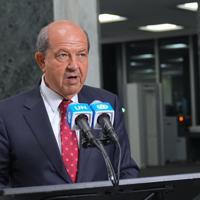NEW YORK
Turkish Cyprus President Ersin Tatar said Friday it is time for a fresh strategy on the Cyprus issue that reflects the island’s current realities, after decades of failed federal talks.
Speaking at U.N. headquarters following his meeting with Secretary-General Antonio Guterres, Tatar noted that over 50 years of negotiations based on a federal model have yielded no results.
He referenced March and July agreements with the Greek Cypriot side aimed at building confidence and launching new initiatives, adding that he approaches an upcoming U.N.-sponsored trilateral meeting with goodwill and optimism.
Tatar expressed optimism that discussions could lead to tangible steps on matters like new crossing points, interconnectivity, and electricity and water supplies.
“These steps will improve daily life and strengthen people-to-people communication across the island,” he said.
“My fundamental message is clear: the two peoples of Cyprus urgently need to establish cultural cooperation.”
Emphasizing the existence of two distinct peoples on the island, each with their own democratic structures, identities, and goals, Tatar stressed, “For any solution to be sustainable, it must be based on our sovereign equality and international status.”
“Cooperation between the two sides, particularly in the areas of individual trade, public health, the environment, and resource management, must become a common priority,” he said.
He pointed out that global challenges like climate change, pandemics, and energy security demand collaboration until a political resolution is achieved, calling for arrangements that foster interaction rooted in equality, dignity, and mutual respect.
On Palestine, Tatar voiced Turkish Cyprus’ deep concern over the “genocide” against Palestinians, welcoming recent recognitions of the Palestinian state.
The Cyprus problem has persisted for decades between Greek Cypriots and Turkish Cypriots, despite repeated U.N.-led diplomatic efforts for a settlement.
Ethnic violence from the early 1960s drove Turkish Cypriots into enclaves for protection. In 1974, a Greek Cypriot coup seeking union with Greece prompted Türkiye’s intervention as a guarantor power to safeguard Turkish Cypriots.
Turkish Cyprus was established in 1983. Recent peace efforts, including a 2017 attempt in Switzerland involving guarantors Türkiye, Greece, and the U.K., have stalled. The Greek Cypriot administration joined the EU in 2004, the year Greek Cypriots rejected a U.N. reunification plan.

